| Listing 1 - 10 of 71 | << page >> |
Sort by
|
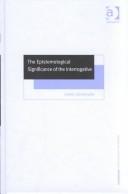
ISBN: 0754607836 Year: 2002 Publisher: Aldershot : Ashgate,
Abstract | Keywords | Export | Availability | Bookmark
 Loading...
Loading...Choose an application
- Reference Manager
- EndNote
- RefWorks (Direct export to RefWorks)
Book
ISBN: 9023226658 Year: 1992 Publisher: Assen Van Gorcum
Abstract | Keywords | Export | Availability | Bookmark
 Loading...
Loading...Choose an application
- Reference Manager
- EndNote
- RefWorks (Direct export to RefWorks)
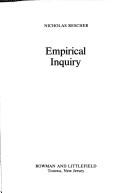
ISBN: 0847670279 Year: 1982 Publisher: Totowa Rowman & Littlefield
Abstract | Keywords | Export | Availability | Bookmark
 Loading...
Loading...Choose an application
- Reference Manager
- EndNote
- RefWorks (Direct export to RefWorks)
Book
ISBN: 9780199698134 0199698139 Year: 2012 Publisher: Oxford : Oxford University Press,
Abstract | Keywords | Export | Availability | Bookmark
 Loading...
Loading...Choose an application
- Reference Manager
- EndNote
- RefWorks (Direct export to RefWorks)
"This volume presents a series of essays which investigate the nature of intellectual inquiry: what its aims are and how it operates. The startingpoint is the work of the American pragmatists C.S. Peirce and John Dewey. Inquiry according to Peirce is a struggle to replace doubt by true belief. Dewey insisted that the transformation was from an indeterminate situation to a determinate or non-problematic one. So Isaac Levi's subject is changes in doxastic commitments, which may involve changes in attitudes or changes in situations in which attitudes are entangled. The question of what justifies modification of doxastic commitments is a normative one, and so may not be understandable in purely naturalistic terms."--Dust jacket.
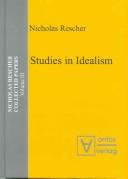
ISBN: 3110326329 9783110326321 9783937202815 3937202811 3110325373 9783110325379 3937202811 9783110325379 Year: 2005 Volume: 4 Publisher: Franfurt am Main: Ontos,
Abstract | Keywords | Export | Availability | Bookmark
 Loading...
Loading...Choose an application
- Reference Manager
- EndNote
- RefWorks (Direct export to RefWorks)
Book
ISBN: 9780521193979 9781139047982 Year: 2021 Publisher: Cambridge, United Kingdom : New York, NY, USA : Cambridge University Press,
Abstract | Keywords | Export | Availability | Bookmark
 Loading...
Loading...Choose an application
- Reference Manager
- EndNote
- RefWorks (Direct export to RefWorks)
Aristotle is a rarity in the history of philosophy and science - he is a towering figure in the history of both disciplines. Moreover, he devoted a great deal of philosophical attention to the nature of scientific knowledge. How then do his philosophical reflections on scientific knowledge impact his actual scientific inquiries? In this book James Lennox sets out to answer this question. He argues that Aristotle has a richly normative view of scientific inquiry, and that those norms are of two kinds: a general, question-guided framework applicable to all scientific inquiries, and domain-specific norms reflecting differences in the target of inquiry and in the means of observation available to researchers. To see these norms of inquiry in action, the second half of this book examines Aristotle's investigations of animals, the soul, material compounds, the motions of heavenly bodies, and respiration.
Inquiry (Theory of knowledge) --- Aristotle. --- Science --- Philosophy.
Book
ISBN: 2130640672 Year: 2008 Publisher: Paris : Presses Universitaires de France,
Abstract | Keywords | Export | Availability | Bookmark
 Loading...
Loading...Choose an application
- Reference Manager
- EndNote
- RefWorks (Direct export to RefWorks)
La pensée occidentale est en crise, tant dans sa rationalité que dans ses valeurs. Si elle connaît aujourd'hui une problématisation aussi profonde, c'est que son fondement même s'est écroulé. La problématisation, qu'on le veuille ou non, est devenue notre destin, la nécessité incontournable qu'il faudra bien théoriser. Depuis plusieurs siècles, le Cogito était considéré comme le fondement ultime de la pensée et incarnait le modèle formel de toute réponse. La conscience, en cessant d'être ainsi l'originaire de la rationalité occidentale, a cédé peu à peu la place à des remises en question de plus en plus radicales, oscillant entre le nihilisme, avec son culte de l'indicible, et le scientisme, avec son espérance de voir la science tout résoudre par sa rigueur et ses résultats. La philosophie du questionnement prend donc la problématicité des êtres et des choses comme nouveau point de départ, comme une positivité à concevoir comme telle. Elle met en forme la diversité interrogative, en la pensant non plus comme un mal, mais comme la nature même de la pensée. Entre Socrate, qui questionnait sans répondre, et Platon, qui répondait sans plus se soucier du questionnement, la problématologie ouvre une troisième voie. Mais pour saisir sa propre émergence, elle doit d'abord se pencher sur l'histoire de sa propre impossibilité jusqu'à aujourd'hui, et en étudier les expressions de substitution, au travers des grandes philosophies. Car philosopher, c'est questionner, même si cela n'a pas consisté pour ces pensées à questionner le questionnement.
Inquiry (Theory of knowledge) --- Science --- Questioning. --- Philosophy.
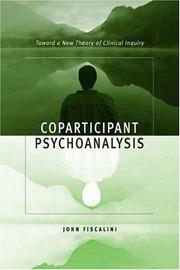
ISBN: 023113262X 0231132638 0231507267 Year: 2004 Publisher: New York : Columbia University Press,
Abstract | Keywords | Export | Availability | Bookmark
 Loading...
Loading...Choose an application
- Reference Manager
- EndNote
- RefWorks (Direct export to RefWorks)
Traditionally, two clinical models have been dominant in psychoanalysis: the classical paradigm, which views the analyst as an objective mirror, and the participant-observation paradigm, which views the analyst as an intersubjective participant-observer. According to John Fiscalini, an evolutionary shift in psychoanalytic consciousness has been taking place, giving rise to coparticipant inquiry, a third paradigm that represents a dramatic shift in analytic clinical theory and that has profound clinical implications. Coparticipant inquiry integrates the individualistic focus of the classical tradition and the social focus of the participant-observer perspective. It is marked by a radical emphasis on analysts' and patients' analytic equality, emotional reciprocity, psychic symmetry, and relational mutuality. Unlike the previous two paradigms, coparticipant inquiry suggests that we are all inherently communal beings and, yet, are simultaneously innately self-fulfilling, unique individuals. The book looks closely at the therapeutic dialectics of the personal and interpersonal selves and discusses narcissism-the perversion of the self-within its clinical role as the neurosis that contextualizes all other neuroses. Thus the goal of this book is to define coparticipant inquiry; articulate its major principles; analyze its implications for a theory of the self and the treatment of narcissism; and discuss the therapeutic potential of the coparticipant field and the coparticipant nature of transference, resistance, therapeutic action, and analytic vitality. Fiscalini explores "analytic space," which marks the psychic limit of coparticipant activity; the "living through process," which, he suggests, subtends all analytic change; and "openness to singularity," which is essential to analytic vitality. Coparticipant Psychoanalysis brings crucial insights to clinical theory and practice and is an invaluable resource for psychoanalysts and therapists, as well as students and practitioners of psychology, psychiatry, and social work.
Clinical psychology. --- Psychoanalysis. --- Inquiry (Theory of knowledge)
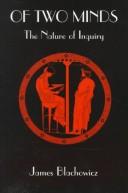
ISBN: 079143642X Year: 1998 Volume: *3 Publisher: Albany (N.Y.) : State university of New York press,
Abstract | Keywords | Export | Availability | Bookmark
 Loading...
Loading...Choose an application
- Reference Manager
- EndNote
- RefWorks (Direct export to RefWorks)
Book
ISBN: 9782130589310 2130589316 Year: 2011 Volume: *14 Publisher: Paris: PUF,
Abstract | Keywords | Export | Availability | Bookmark
 Loading...
Loading...Choose an application
- Reference Manager
- EndNote
- RefWorks (Direct export to RefWorks)
Ce livre est l'un de ces traités de philosophie comme il n'y en a plus eu depuis plus d'un demi-siècle : une synthèse des savoirs et un renouvellement des principes de la philosophie, ce qui de nos jours est une nécessité. Avec la liberté c'est le problème de l'Autre qui surgit. Meyer montre que cette altérité s'enracine au départ en chacun avec l'idée du corps donc, à terme, de la mort. La religion répond à cette question, comme le droit répond à la question de l'Autre qui n'est pas soi et l'économie à l'Autre qui est chose. Le livre de M. Meyer se présente ainsi comme une véritable synthèse des problèmes ultimes de la philosophie : Soi, le Monde et Autrui. Que ce soit la morale ou l'art, la religion ou le droit, la science ou toutes les questions que l'homme se pose sur lui-même de façon immédiate, rien n'est laissé de côté dans cet ouvrage qui, par delà les synthèses, bouleverse les façons de penser héritées du XXe siècle.
Inquiry (Theory of knowledge) --- Questioning --- History --- Philosophy --- History - Philosophy
| Listing 1 - 10 of 71 | << page >> |
Sort by
|

 Search
Search Feedback
Feedback About UniCat
About UniCat  Help
Help News
News